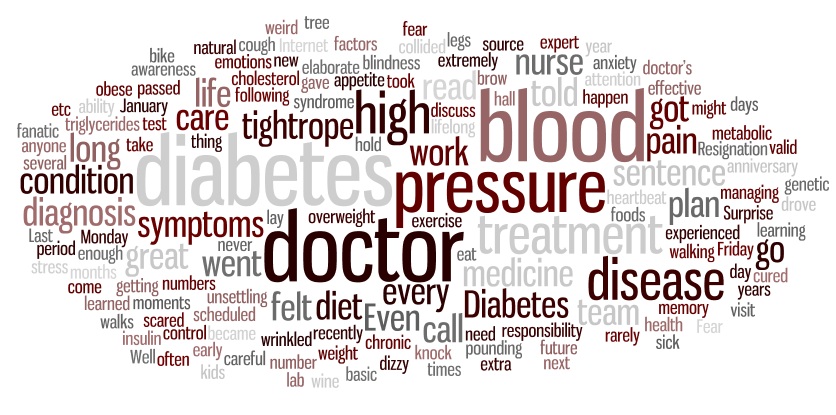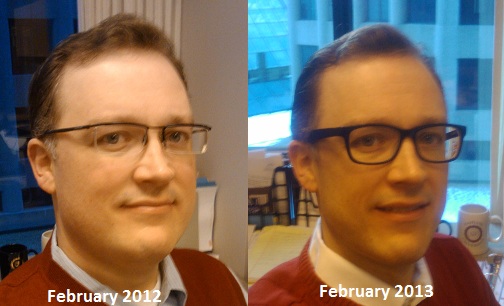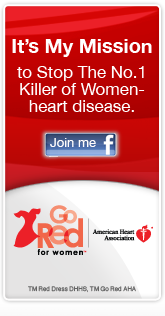Today’s author is a long-time colleague, friend, and neighbor. Rand and I worked together for years, we live within blocks, and we’ve kept in touch, professionally and personally, as the jobs change and the kids grow. When I started shouting about heart disease from the rooftops, Rand asked to meet for lunch or coffee. He, much more quietly, told me he’d been diagnosed with diabetes.
So here we are, both too young for the “old person” diseases we have, both wondering why, both angry, both scared. But also both committed to being, as Rand says, our “own primary caregiver.” And it struck me how much in common we have: these themes are not disease-specific, they are universal to those of us who are not-well in any form. We, as a group, will be far more powerful than any one disease-du-jour or color-of-the-month. This — active, engaged patients asking why, armies of “our own primary caregivers” reading journals and studies and pushing for a better life, not just survival — this is what will change the course of disease treatment. This is what will make us well.
I’m so grateful that Rand wanted to share his story here, and so inspired by the incredible progress he has made.

My Own Primary Caregiver
by Rand Park
Last January I got a call from my doctor’s office that literally changed my life. For several months I had been experiencing a cluster of weird symptoms, from a pounding heartbeat to pain in my legs, but I never felt sick enough to go to the doctor. What drove me to the doctor was a persistent cough that only seemed to happen when I was in the middle of a sentence. My wife told me to go to the doctor to check it out.
Once at the doctor, the nurse took my blood pressure and wrinkled her brow. My blood pressure was extremely high. They sent me down the hall for basic labs, gave me some blood pressure medicine, and scheduled fasting lab work for the following Friday. The next Monday I got “the call.” The nurse told me that I would need to come in to schedule a visit with the doctor to discuss my “diabetes.”
What? Diabetes? Here were some of the emotions I experienced upon learning the diagnosis:
Surprise
I was only 46 years old. I was overweight but not obese. I went for long walks and bike rides. I was a food fanatic and often chose whole and natural foods that I cooked and prepared for elaborate meals. I loved beer and wine and drank some every day, but rarely to excess. I had some diabetes in my family tree, but no memory of anyone getting it in their forties.
Anger at myself
Well, the numbers don’t lie. I had metabolic syndrome –high blood pressure, high cholesterol and triglycerides, and type 2 diabetes. I had been walking on a tightrope with my extra weight and unrestricted appetite, and any number of environmental and genetic factors collided to knock me from that tightrope into the lifelong chronic condition of diabetes.
Fear
I was scared, so I went to the Internet to research my new disease, but it only increased my fear and anxiety. All I read about was pain, insulin shots, amputations, blindness, and a life sentence of restricted diet and declining health. Even with a great care team and a treatment plan that was very effective, I had moments where I felt dizzy with stress about what the future might hold, and how the disease would affect my marriage, my ability to work, my kids, etc.
Resignation and responsibility
Even with a great care team and a treatment plan, the most important thing I learned early on was that I was my own primary caregiver. I had to exercise, eat a careful diet, take my medicine and test my blood sugar. I read every valid source I could find about managing diabetes, and became a lay expert on the disease and treatment. Diabetes is a long term condition that requires daily, even hourly, attention. No days off, period.
I’ve recently passed my one year anniversary of diagnosis, and my symptoms are under control. But I’m not cured, and that awareness can be unsettling at times.

Rand Park is a 47-year-old married father of two who lives in St. Paul, Minnesota. After a year of medication, diet and exercise he lost 40 lbs, and is now managing his Type II diabetes via diet and exercise alone.



Recent Comments